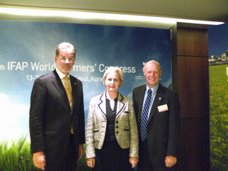The large scale political violence after the disputed Kenyan presidential elections in 2007 heavily affected the country. Not surprisingly it has also deeply affected Kenya National Federation of Agricultural Producers (KENFAP), its operations and its members. During the last months of 2007 and the first four months of 2008 KENFAP could not carry out its program normally. Some of the KENFAP regional staff was displaced and hence deployed elsewhere. Moreover, Kenya was not safe to travel, especially in the affected areas. The Kenyan farmers have lost a lot over during the political violence. Farms have been burnt, several of got killed especially in the most affected areas, stores were destroyed, roads were blocked. Due to destroyed infrastructure milk and other perishables couldn't access markets or processing plants. Meanwhile people in the urban areas were lacking food and supplies. Some of Kenfaps' staff and members have lost all that they owned during the process of ethnic animosity.
Some days after the violent outburst Kenfap - in coalition with some other organizations – made firm press statements calling upon peace and reconcilement and appealing leaders and politicians to set personal interests and emotions aside. Additional, KENFAP took the initiative of a massive effort to restore peace and foster reconciliation in the affected districts. KENFAP initiated peace and reconciliation meetings at district and local level attended by local stakeholders from all levels and farmers. It gave the participants room to express their anger, fear and frustration, but those meetings also led to mutual understanding among people with different ethnic backgrounds. Moreover the information that elicited from the participants during the meetings proved to be a very powerful package in the lobby and advocacy efforts towards the national government. This has given KENFAP a leading voice articulating farmers’ issues in the national debate after the post election violence, especially concerning rising costs of seeds and fertilizers and looming food shortages as a result of the violence. In short KENFAP recognition has grown dramatically as a result of the leading role KENFAP took in the aftermath of the disputed elections. The highlight was the KENFAP meeting of national farmer leaders in Nairobi on March 14th, attended by Prime Minister Raila Odinga and Nobel Peace Prize Laureate Wangari Mathaai.
Besides Agriterra's support at the crises relief stage, various others such as GTZ, GOAL, Mercy Corps came in and partnered with KENFAP at a number of issues. Although peace-building doesn’t belong to a farmer organizations’ core business, KENFAP 's interference was of great importance. At the point the entire systems in Kenya went down, even the government could not intervene, but KENFAP did. KENFAP was able to pacify the antagonistic communities all the way to the local level. kENFAP took its responsibility on matters affecting its members.
By date, the situation has slowly turned back to normal and consequently KENFAP has been resuming its normal activities. Issues of skyrocketed prices of fertilizers and seeds and looming food shortages however remain on the lobby agenda of Kenfap.
Monday, May 19, 2008
Subscribe to:
Post Comments (Atom)
Check these interesting contributions from other sites & blogs
- On Farmers Organization in Egypt
- Law on farmers Organizations in China
- Interview with FAO officials on Farmers Organizations
- Farmers use mobile phones
- comment of Kees Blokland on anti-CAP campaigning
- Poverty & growth blog of the World Bank
- Gapminder statistics visualized
- Guide for implementing ICT projects - iCommons december 2006
- Africa: tools of liberalisation - Patricia Daniel, University of Wolverhampton, England
- Business and the rural poor - Harvard Business School
- Profiling Asian Farmers Association members - Jan 4th, 2007
- Fiji Times report on AgriCord grants to Sugar Farmers - January 04, 2007
- Increasing Impact - marrying micro-credit and micro-insurance - The disconfort Zone, january 4th, 2007
- Programs that Fight Poverty - Institute for Advanced Technologies in Global Resilience - November 17, 2006
- University of Chicago Press Journals reports on GMOs - January 25, 2007
- Biotech crops to help reduce poverty - Kauser A Malik, in the Daily Times (Pakistan) January 25, 2007
- Why does China grow so fast - Michael Spence The Wall Street Journal 23 january 2007






No comments:
Post a Comment